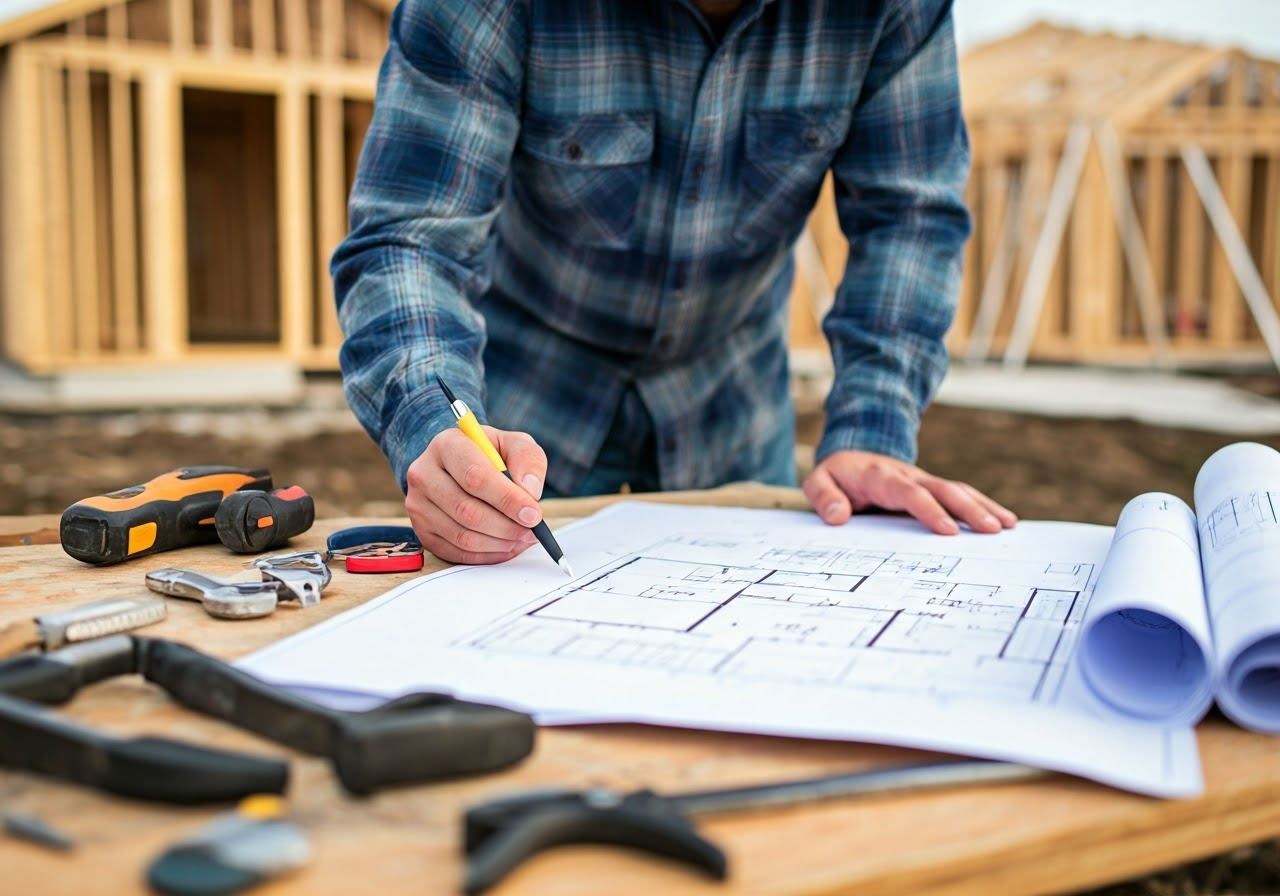Ever regretted hiring the wrong contractor? You are not alone! Many homeowners and business owners have learned the hard way. They placed their trust in unlicensed electricians for a construction or remodeling project.
Well, guess what? They were left with poor wiring. And the worst? Some of them ended up having dangerous electrical hazards that nearly cost lives. For something as critical as electricity, cutting corners is very wrong.
This is why you should choose a licensed electrician service for your new construction and remodeling projects. Join us in this blog as we show you what licensed electrician services bring to the table and why you should choose them.
Let’s begin!
Key Highlights
- Proper assessments by experienced electricians save time.
- Safety is very important in every electrical installation.
Understanding Licensed Electrician Services

Licensed electrician services are more than basic electrical work. Professional electricians are trained to address complex electrical tasks. This includes the planning, installation, and maintenance of electrical systems in residential, commercial, and industrial settings.
They get their qualifications from passing state-certified electrical training programs. This is why they are important for construction or renovation projects. They also have electrician certifications like journeyman licenses, electrical contractor, or master electrician licenses.
This means that they have the right skills to give you quality customer service for all your electrical needs. And guess what? They will also follow all the safety and compliance regulations to give you reliable electrical work.
Importance in new construction
Efficient electrical systems are the strength of any new construction project. Licensed electricians know how to design and install emergency power systems. They will ensure you have a consistent power supply and safety.
Their expertise in meeting electrical license requirements is important. They make sure it is in sync with building codes and regulations. This reduces risks from faulty installations.
A major benefit of hiring a licensed electrician for new construction is their ability to create custom layouts for the electrical needs of your property.
Whether you need lighting placement or energy-efficient solutions, these experts can help. Proper planning helps to ensure that everything follows the industry standards.
Also, these experts go through electrical training programs, aptitude tests, and journeyman exams. This shows their years of experience and commitment to quality.
Role in remodeling projects
Remodeling projects usually require upgrades to the existing electrical systems. This helps to suit updated space designs. Licensed professionals ensure that this electrical work is done properly.
With certifications like a journeyman electrician license, they identify outdated wiring. This also helps them to properly upgrade your system and install modern electrical components.
Hiring a licensed electrician for remodeling is a good choice. They can adapt electrical systems to meet the electrical needs of the space.
For example, they can install energy-efficient outlets and modern switchboards. Even if you need innovative security systems, these experts can help. Their attention to detail helps to improve the value and beauty of your property.
Licensed electricians also work under tough guidelines. This ensures they comply with relevant codes and regulations.
The guided supervision of a licensed electrical contractor during remodeling ensures your new electrical setups are done properly. The truth? Licensed and certified electricians bring success to your remodeling projects.
Preparing for Electrical Installation Projects
Preparing for electrical installation projects requires proper planning. Property owners and contractors must ensure that the building plans are compatible with electrical requirements.
During the planning, every step is important. You need every essential material and licensed professionals to get the best result. Licensed professionals use their skills to simplify the project phases. This is important during the planning and execution stage.
Safety measures and compliance standards
Safety is very important in every electrical installation. Licensed electricians follow all the electrical safety measures to prevent hazards like short circuits or fires.
They follow the compliance standards set by state departments or organisations like the Department of Industrial Relations. This ensures that all electrical systems meet the necessary legal requirements.
One critical practice is conducting on-site assessments. This helps to evaluate risks before starting work. Licensed electricians also use personal protective equipment (PPE) to protect themselves during installations. This includes gloves, helmets, and goggles.
Compliance is more than ensuring your safety. It also involves meeting environmental standards and using energy-efficient electrical systems. Licensed electricians make sure that the materials and methods comply with the regulations. This helps to reduce future liabilities.
Step-by-Step Guide to Managing Electrical Installations

Successful electrical installations involve a structured process. It requires precision and efficiency. If you are either constructing a new building or renovating an existing one, following these steps can ensure the project goes well.
Step 1: Assessing your electrical needs
You should always make sure you know your electrical needs before installing anything. A licensed professional will inspect your property to determine the scope of work. At this stage, the system’s design is checked to confirm it follows the necessary steps and regulations.
Qualified electricians check the blueprints or existing layouts. This helps them to identify areas for improvement or upgrade. These areas include outdated panels or insufficient wiring.
They also consider property usage patterns. This ensures that the electrical systems can handle your expected loads.
Another essential aspect is compatibility with technology trends like smart home features or energy-saving systems. Proper assessments by experienced electricians save time. This prevents costly errors during later installation phases.
Step 2: Planning the electrical layout
Planning how the electricity will be laid out helps to ensure the project is done correctly. Licensed professionals, including electrical contractors, plan the routes for wires and the locations for outlets. They also switch locations to improve functionality.
A well-made plan helps to ensure that electrical systems fit properly with the building’s structure. This way, you avoid overloading circuits and having wires that are difficult to reach.
Professionals rely on advanced tools to design buildings. They follow the regulations, issue permits, and include energy-saving measures. Clear communication with other contractors is vital during planning.
Electricians work with architects, plumbers, and HVAC professionals. This helps to create harmony between the systems during the construction phases. If you plan well, your layout will be suitable for your present and future needs.
Step 3: Executing the installation
Executing installation requires precision and the right skills. Licensed electricians ensure they plan properly. They use tools and techniques that guarantee efficiency. Job training ensures they follow protocols. This includes testing and securing connections for safe operation.
During installation, electricians follow the National Electrical Code. This ensures compliance and reduces risks, like circuit failures or power issues. Their attention to detail guarantees seamless wiring integration, proper grounding, and accurate fixture placements.
Supervision by experienced professionals ensures you get the best results. Teamwork is also important. Electricians work with other trades to address any challenges during installation. Proper execution makes your electrical systems reliable.
Choosing The Right Licensed Electrician
Choosing the right licensed electrician is a critical decision. This decision will affect the project outcomes. Professionals with electrical contractor licenses are reliable and experienced. They ensure your electrical installations are done properly.
When choosing an electrician, verify certifications and credentials, like a journeyman license or electrician master license.
This gives you peace of mind knowing that they have completed the training programs required for the licensing requirements. Licensed electricians like Frontline Pro Services prioritise quality services without compromising budgetary needs.
Here in California, Frontline Pro Services is the right choice for your electrical constructions and remodeling project.
We have licensed and certified electricians who have the required work experience to help you. And guess what? We give quality services at affordable rates. Contact us now!
Frequently Asked Questions
What certifications should a licensed electrician in California have?
In California, licensed electricians must hold certifications such as residential electrician certification or general electrician certification. It should be issued by the Department of Industrial Relations.
Other qualifications may include a contractor license or an electrician certification. Some also have proof of completion of an approved apprenticeship program.
How can someone become a licensed electrician for construction or remodeling work?
To become a licensed electrician, the individual needs to attend a trade school or vocational school to meet the education requirements as an apprentice electrician. After obtaining an apprentice license and completing training, they must pass an exam with a passing grade and apply for a trade license.
Every local city has different rules. It’s important to check with the local government. Agencies like the Contractors State License Board, Division of Labor Standards Enforcement, and Department of Industrial Relations can guide each step of the process.
What are the benefits of hiring a licensed electrician for my project?
Hiring a licensed electrician helps protect your building. It also supports electrical businesses by creating more job opportunities for skilled workers within the electrical trade, potentially leading to higher pay for these professionals. Licensed electricians understand the job market and follow the rules.
Many have training from a trade school or vocational school. So they know how to handle projects in local cities. Some even run their own business. This helps to grow the community.


